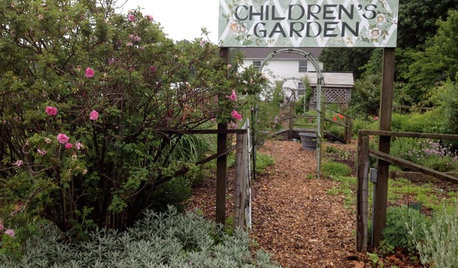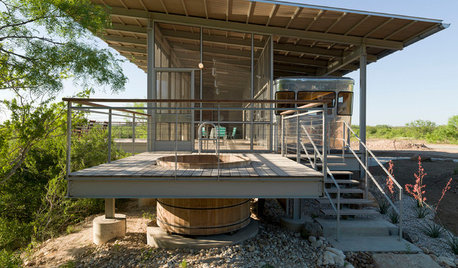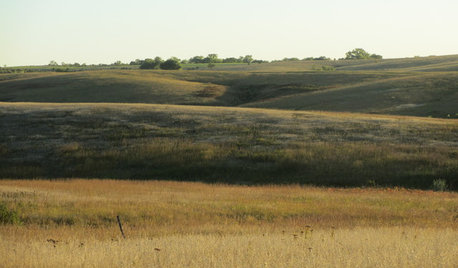Living Next to a Corn Field
I put an offer on a property that my wife and I just think is amazing. It's a beautiful 2 acre lot surrounded by farm land and backs up to a creek. A corn field borders one entire side of the property, which is basically a big square. There is a about a 10-15 foot line of trees and brush between the corn field and this property - pretty thick in some spots, kind of open in others.
When we started thinking about what gets sprayed on that corn field, we started to get a little concerned. We have a newborn son and may want to try for another at some point, so that's our primary concern. The second major concern has to do with one of the main reasons we're looking for this type of property: we want to grow our own organic vegetables and keep chickens. I've been a backyard gardener for quite a while and I want to take it to the next level. I envision growing grapes, fruit trees, and a large area for vegetables.
I spoke to the farmer next door and he was very nice. He said he applies Roundup 2-3 times during the growing season and a chemical with 2,4D every other year. He said he'd be happy to give me a heads up a couple days in advance of any spraying and assured me that all spraying is well documented and not done during days of high heat or wind.
My wife and I have spent more than a year looking for the right place and we love everything about this property except for it's proximity to the corn field. Is this something you think would be tolerable given what we're trying to do, or would you avoid a property like this if you want to ensure your family stays healthy?
Comments (46)
glib
11 years agolast modified: 9 years agoTough question. But if you want to improve your chances of stopping any spray drift, google hybrid australian willow and you will see something that will form a windrow in two years tops (a seedling should not cost more than $2, and if you border the field for 300 ft, 100 trees will be plenty). Perhaps plant it in a double row, triple where the existing row has gaps. Just make sure they are away from your septic tank. If you want a windrow that is evergreen and will block spray even in early spring or winter, bamboo is a possibility.
My neighbor applies something to his lawn every spring, so I am in the same boat as you (I am in great health). This year, the spray drift apparently hit two young black cherry trees on my side, and the trees were damaged but have recovered. Some of the chamomile under them also got it and recovered, while rhubarb, ostrich fern and strawberries did not show damage. One apple tree on his side showed no damage. Also I consistently fail to kill weedy aronia seedlings with Roundup in my yard, whereas poison ivy is zapped with 100% efficiency. There is a wide range of susceptibility to RU, and the existing plants in that row may give you clues.
The willow hedgerow may be a good start while you grow other, slower species. Bamboo will give you evergreen protection also fairly fast. Surely any spray can be blocked with high efficiency given a thick enough vegetation belt.
Related Professionals
Cottonwood Landscape Architects & Landscape Designers · Maple Heights Landscape Architects & Landscape Designers · Alexandria Landscape Contractors · Wakefield Landscape Contractors · Andover Landscape Contractors · Arlington Landscape Contractors · Franklin Landscape Contractors · Mission Bend Landscape Contractors · Painesville Landscape Contractors · Pikesville Landscape Contractors · Rancho Santa Margarita Landscape Contractors · Suitland Landscape Contractors · Vallejo Landscape Contractors · West Chicago Landscape Contractors · Cheshire Gardeners & Lawn Carepnbrown
11 years agolast modified: 9 years agoBiggest concern, IMO, is groundwater quality. Not just next door but no doubt the property you are looking at was dosed multi-annually with poisons for decades. Likely you will have a well, unless there is municipal water at the road front, probably not from your description of the area. One can manage to import drinking water but the bigger issue is bathing, the poisons are known to easily pass the skin barrier, and chronic exposure at a very young age is the big problem. So spend the money to get a serious analysis of a water sample from a private lab. But where to get the sample since there is no well? From that friendly neighbor. If that water is contaminated then forget it.
I am all current on this because my daughter and SIL just had a baby and are also looking for a place. They passed on a great opportunity, fixer-upper house on a nice big property abutting a 30-acre orchard. The orchard has been there since the early 40's. Once we started reading about the poisons that were commonly used until the late 70's the decision to pass on it was a no-brainer.
Do some searching on health problems in developments built on former orchards and croplands.
ltilton
11 years agolast modified: 9 years agoOne thing to consider is how likely it is that you'll be able to find a pristine property, better than this one in that respect.
buckyz4
11 years agolast modified: 9 years agoWhat other options do you have? Chances are that unless you are able to purchase land off of an organic farmer or surrounded by an organic farmer no matter where you go you will be in the same boat. I think this situation is much better than living in a city like millions of people do. Even suburbs with all the chemicals that are put onto there lawns, what the farmer puts on his field is probable much safer, would be much too costly to over apply like many homeowners to.
rhizo_1 (North AL) zone 7
11 years agolast modified: 9 years agoI so appreciate your quandry. This is non-issue for me. I wouldn't consider purchasing that property for one second. When my husband and i were looking for a home some years ago, we were shown several lovely locations next to cropland. The chemicals are not safe for you, your kids, nor your grandchildren. Those properties are difficult to sell....we had to get our sales agent to promise to stop taking us to these properties. We eventually found the perfect location.
Another thing to think about is that farmland is being sold off rapidly all across the country. Some of that picturesque land we looked at 8 years ago is now full of new development with houses packed like sardines on tiny lots.
sunnibel7 Md 7
11 years agolast modified: 9 years agoTo help with perspective, you could always move to suburbia where your (thousands) of neighbors all put RoundUp, fertilizers, and serious pesticides (which are allowed to be worse than the ones used on our food supply) on their lawns 3/4 of the year... The sad truth is there is no more pristine land and you take your risks living where ever you choose.
Certainly pay for a well test. It sounds like there is already a windrow between you and the field, so that's good. Are you uphill or downhill from the field? East, west, south, or north? Those affect chemical drift throug air and water. It's really a personal decision, but those are some of the things I would think about and look into if I were making the choice. Good luck!
jimmder
Original Author11 years agolast modified: 9 years agoGreat responses! Thank you so much.
I agree that groundwater quality is of major importance. I am having the well tested next week and am paying extra to test for pesticides/herbicides in addition to the standard test. The contract is contingent on this outcome with the main concern being atrazine. I guess if any detectable amount of that is present we'd have to cancel the contract, but I do wonder if there are trace amounts even in municipal water supplies or the average well in a subdivision.
The house faces a road on the west side, which is the high point of the property. It slopes east toward the back or the property. The corn field is on the north side. The farmer told me the wind generally doesn't blow toward the house, but I like the idea of looking into the Australian Willow as an option to prevent drift.
I also think it's a great point that options are becoming more and more limited - there really isn't much pristine land available anymore. I'm sure millions of people live in suburban neighborhoods that had much more dangerous chemicals put on the ground for decades before their subdivision was built. One of the things that's so attractive about this property is that it's part of the Agricultural Reserve of Montgomery County Md, which significantly limits to extent to which it can be developed in the future. The trend in this area is toward organic farming and new organic farms are popping up in this area all the time.
pnbrown
11 years agolast modified: 9 years agoJim, the concern is not so much what chemicals have been used recently, but what highly toxic poisons were used for many years in the past century.
I would strongly resist the idea that most places are equally contaminated. That assertion fails completely. Groundwater contamination is known to move in plumes, for one thing. For another is the obvious fact that some places were settled, farmed, and largely abandoned by small-scale industries and farm operations before the chemical paradigm set in. There are endless examples of that - I live in such a place. Other places are in watersheds contaminated to various degrees by industry and or agriculture in the past century. Those are the places where the vigorous testing such as you plan to do must control the decision.
ltilton
11 years agolast modified: 9 years agoA cooperative neighbor is a great asset. I know a market gardener whose neighbor's helper sprayed her pasture by mistake. There went her organic certification for N years.
wayne_5 zone 6a Central Indiana
11 years agolast modified: 9 years agoAs far as well water contamination goes, There could be a very tiny amount that might be less harmful than city water that is chlorinated and fluorinated. I live in the country and suggest that it could be hard to find a pristine spot.
colokid
11 years agolast modified: 9 years agoIf you ever want a place you had better grab it. Backs up to a creek? all most never found again. I am a retired farmer who now lives in the city. I would rather have a friendly farmer next to me than un-knowing neighbors in the city that spread all kind of stuff with out thinking. Ask me how I know. If he is care full to not spray the trees the biggest risk would be 24D drift to tomatoes. Any problems should have shown up on the trees I don't think there is a place in the world that is 100 percent safe any more. Go for it.
glib
11 years agolast modified: 9 years agoOne thing about water quality: it is probably restored to pristine with just a carbon filter, I am fairly certain it catches anything organic, as well as most heavy metals. Great thread, and my city gets well water, I think I should get a carbon filter myself, if nothing else, a small one for drinking water by the kitchen sink.
Re: the willows. They do grow 12 ft/year, like hardy kiwis but of course they are upright trees, not vines, which will eventually get to 80 ft. You can plant twice what you need and harvest the wood for oyster mushroom logs in three years, and the branches and twigs for compost. You have to water, but only the first year. You could even decide to plant them now if you can run a drip line along the fence shortly thereafter, and get yourself ahead by one year. Though bamboo is edible and will stop spray any time of year, and usually can be had for free from those who have it.
ifraser25
11 years agolast modified: 9 years agoBuy! The advantages of your property far outweigh the disadvantages, especially when you have a 1 in a 100 farmer next to you who is willing to converse.
RpR_
11 years agolast modified: 9 years agoYou could do as a gent I worked for dig a second deeper well as he did when his first well became unsafe for human consumption accoring to the State of Minn. anyway.
I also drank out of the condemned well and seem to still be alive and breathing.
pnbrown
11 years agolast modified: 9 years ago"I don't think there is a place in the world that is 100 percent safe any more"
What has that to do with the price of tea in China? When has there ever been a place in the world completely safe?
And since RPR has drunk contaminated water then obviously washing a child in contaminated water every day of his life makes good sense. Got it. You guys should see if you can get teaching jobs in the sciences. Luckily there is no need to worry about the creek water because kids would never go in a creek, we know that, right? Nor dogs, and wet dogs never get anything else wet anyway. Also it's highly unlikely that ground that was farmed all through the 20th century has any undesirably high concentrations of heavy metals in it, really, why worry about it? I'm sure none of this has anything to do with the cancer epidemic. Anyway, it's impossible to know, all the soil and water testing laboratories have shut down, I guess, right?
Glib, check out the british berkefeld brand of gravity water filters. We have been using them for years, very good.
sunnibel7 Md 7
11 years agolast modified: 9 years agoPat, you usually don't take things so personal, is everything ok?
The comment about farmers not wanting to converse I found odd, though. I've met many and they've always been willing to answer a few questions, especially about land and agriculture. But it helps that I grew up in a rural area and know that today's farmer is often busier than a cat in a room full of rocking chairs and often doesn't have time for a half-hour chat. If you stop a man on his tractor, you've interupted him mid-task, and he may not wish to sit a spell. Same thing at a store, and so on. Catch one at the right moment, though and you'll get a story or two! :) Cheers!
glib
11 years agolast modified: 9 years agoSurely Pat is one of the most knowledgeable people here, and for folks with well water, the advice is very good. I just checked the analysis of my city water, it looks OK but the water pH is 9.3! That can not be good. Suggestions on how to modify my drip system to include an acid source?
fruitmaven_wiz5
11 years agolast modified: 9 years agoI'd vote for buying it. Sounds like a nice property with a helpful neighbor and honestly, nowhere is perfect.
howelbama
11 years agolast modified: 9 years agoGlib, not to hijack the thread, but you could put in anez flow injector or something similar and inject some white vinegar...
Jim, I say go for it, land like that is hard to come by, and the friendly farmer neighbor is a rarity too...
Edymnion
11 years agolast modified: 9 years agoIt is worth pointing out that virtually all commercial property that you didn't personally have hacked out of the woods was farmland not more than 50 years ago. Getting worked up over what someone sprayed on the land decades ago isn't going to do you any good, because it will have been sprayed *EVERYWHERE*.
Seriously, if it is remotely near any established town and is remotely suitable for farming, it was farmed at some point. Unless you plan on moving out into Monument Valley, you aren't going to find land that was never sprayed.
pumpkins4u
11 years agolast modified: 9 years agoI wouldn't buy it. Sure the farmer sounds very nice but you don't control and you can count of him to do anything. He could also sell his farm to someone less nice. I don't trust Roundup and the drift could kill your plants and it can also reduce the pollinators in your area.
rhizo_1 (North AL) zone 7
11 years agolast modified: 9 years agoI sure would like you to do some simple research on RoundUp + endochrine damage, + genetic damage, +cellular damage.
Edymnion
11 years agolast modified: 9 years agoOne tip though, if you go looking that up, limit yourself to only research papers published in respected publications. If they aren't linking you to the research, then ignore them.
There are kooks out there that will say anything causes anything just as a scare tactic. You only have to go to Amazon and look up "EMF blockers" to see proof of that.
franktank232
11 years agolast modified: 9 years agoI'd live there, but I'd put in a heck of a water filtration system (probably RO--i'd be worried about nitrates). You could buy some forest land and cut out your own spot for a house, but then you'd probably end up with Lyme's disease. No matter where you live, you will run into problems. How is the commute? A lot of folks who live out n the country that I know complain most about gas prices/time spent in the car.
flowergirl70ks
11 years agolast modified: 9 years agoMy husband and I lived on a dairy farm for many years. this is in the middle of wheat country. We got overspray for years when they sprayed the wheat for weeds. We got a notice from the FDA about using a certain chemical on our alfalfa crop, because it would show up in the milk later. I believe it was atrazine. I hear now, many years later they are still using it on corn.
After we moved to town, 45 years ago, I didn't see an earthworm in the soil here for 9 years. The woman who lived here before us was deathly afraid of bugs. She had Orkin spray in the house every month. It's a miracle any of us survived here. However we had 6 children, and they are all healthy. My husband passed 2 years ago at the age of eighty, and I am now 79. I am thinking that the soil on the place you want to buy has already been contaminated. I would say get a soil test and see how healthy the soil is. It will tell you a lot.two25acres
11 years agolast modified: 9 years agoYour place sounds like it could be mine. We're on 2.25 acres with nieghbors on the right and left and marsh land in the back. We face south and have a corn field accross from us. Most of the time it's corn, sometimes soy beans. Winds come out of the south pretty heavy and there have been times I've gotten an upper respitory infection, generally fall but I do have to pay attention. My garden runs north and south along the west side of the property. We haven't had any problems with losing anything yet and I've been there for 6 years. We have Culligan for water and run test periodically as the water is extremely hard/rusty where we are. Go for it and work with the farmer. They are a wealth of information and the first one I'd go to for help.
fruitmaven_wiz5
11 years agolast modified: 9 years agoFranktank, funny you mention that. My husband's family all live on land that was cut out of forest in northern WI. His dad is disabled with Lymes disease, his sister has it, his aunt and two cousins have it... There are disadvantages to any place you live.
m_lorne
11 years agolast modified: 9 years agoI would argue that eating at McDonalds once per week does more damage to your body than the chance of glyphosphate contaminating a deep drilled well. Nobody likes spraying, but I think your daily, significant environmental contaminations are probably less subtle.
nc_crn
11 years agolast modified: 9 years agoWith all the fracking going on (and soon to go on) in the MidWest/upper-MidWest the water tables should drop adequately to keep glyc from getting into the water table for a few more decades. Woo! Wait...
If any of this new mining + fracking touches too much Colorado River water the SouthWest could have "interesting times" with water availability rather than water quality after a chunk of years. Many states rely on this river to the point of crutching their entire populations on the Colorado River.
So much in the SouthWest and MidWest depends on winter snows feeding the Colorado River.
It sounds political, but behind it all there's serious water use issues at stake because we're talking about high-water-use applications for farming, fracking, mining, and people.
reyesuela
11 years agolast modified: 9 years agoJust because a lunatic thinks there's something dangerous and writes a paper using big words doesn't mean he isn't an idiot and dead wrong. Try "chem trails." You'll see what I mean.
Want to see how safe something is? Look for real scientific studies, and make sure you UNDERSTAND what they are saying.
I challenge anyone to find any study showing that glyphosate is toxic or carcinogenic in the kind of concentrations that you'd be exposed to near a cornfield. It's not something you want to bathe in, but neither are ammonia or bleach, two of the most helpful household cleaners that are perfectly safe if you don't, say, drink them.
Now, if it were a cotton field that had been production for 70 years, I'd be VERY concerned, as there were defoliants used years ago that were extremely toxic, which can cause birth defects and other problems. (Think Agent Orange.)
Heavy metals are still a concern as they used to be used in pesticides. My family was poisoned by arsenic from the retaining pond that overflowed into a stream--came from an Elf Atochem chemical plant that had been "cleaned up" years before, but not nearly enough.
I'd test the groundwater and the stream (and the mud on the banks of the stream--where heavy metal concentrations would be highest). If it's clear, I'd buy.
Of all the things in the world to be concerned about, RoundUp doesn't make that top 10,000. If you are mindlessly afraid of everything, you have no judgment to understand what REASONABLE fears actually are.
> I'm sure none of this has anything to do with the cancer epidemic.Please. Cancer rates lower as tobacco use and primitive wood fire use decrease. And they rise when people smoke more, when they fail to die of infectious diseases at younger ages, and when people get fat. Because smoking outweighs every other cause in the West, cancer rates have been on the decline in the US for decades despite how fat the country has gotten. Because the third world is seeing a dramatic increase in tobacco use, an increase in medical care (meaning that more cancers are actually diagnosed), and a decrease in deaths from things like rotavirus, their cancer rates are spiking. It has nothing to do with modern pesticides and herbicides--which are literally a hundred times safer than older formulations, including many home remedies, which can be terrifyingly toxic. (Old time gardeners would steep tobacco leaves and use the liquid as a poison to control bugs--all "natural" and "organic" and also approximately 10 times more lethal than ANY commercial pesticide EVER put on the market.)
The average Westerner is exposed to a FRACTION of the pollution that they were 40, 60, 100, or 150 years ago, so even if "chemicals" (whatever you mean by that *rolls eyes*) cause cancer, cancer rates would still be way lower now than before.
Ignorant hysteria like this causes people to make stupid choices against their own best interests.
the_sun
11 years agolast modified: 9 years agoThe problem with large scale corn farms is the spraying of atrazine. Atrazine is banned in the EU, but about 76 million pounds are sprayed in the US.
{{gwi:60677}}
Little known disaster about Atrazine is that high levels are found in the water table throughout the US cornbelt. One of the main reasons I choose to continue to live in the wheatbelt, even though our winters suck and droughts are common. Several farmers' families I know at ground zero in Iowa are plagued by bladder issues.
There's tons of info out on the web to read up on it.
Here is a link that might be useful: http://en.wikipedia.org/wiki/Atrazine
dhromeo
11 years agolast modified: 9 years agoReyesuela couldn't have said it any better. My dad grew up on a farm and went to college in the early 70's right at the boom of all of the farm chemicals being developed and used.
He took a graduate course as an undergrad as pass/fail because he didn't want to hurt his GPA, but he said it was the most enlightening class he ever took. He wrote several papers about the dangers of some of the chemicals that were being used, like Atrazine, DDT, 2-4-5-T, and most all of the organophosphate insecticides.
One day in class the instructor was talking about the uses and applications of Atrazine, one of the best chemicals to use to control weeds in corn. Nothing escapes atrazine's control, you can use it as a pre-emergent or post emergent herbicide, it's the greatest thing since sliced bread!
One of the grad students taking the course asked a question when the instructor said what atrazine's half life was. At something over 200 days, That meant that after 400 days there was still 1/4 of the atrazine left intact in the soil. So the grad student asked where the atrazine would go.
The professor reliped that the volume of the soil is so large that atrazine buildup is of no concern. The grad student again stated that it's long half life led to chances of buildup in the soil, because of early or every other year applications in a standard rotation of crops between corn and beans.
The professor and the grad student went round and round, the volume of the soil is so large, an Acre Furrow Slice (1 acre, 7 inches deep) weighs over 2 million pounds..
I garden right next to a mega farmer, I won't mention his name, but he farms about fifty THOUSAND acres. I had the chance to meet him and get to know him, his daughter used to ride at our farm, when we had an operating horse business. Nice guy. He hires people to drive the tractors and spray though.
At times the ground that he farms looks awful, he doesn't tend the ground like he should, his operation sprayed the 40 acres next to me on a day when winds were gusting at 40 MPH, and 20 MPH sustained. So far I've been lucky.
Bottom line is, reyesuela hit it spot on, most chemicals they use today are harmless compared to what they used to use. Atrazine is effective because of how extremely cheap it is. With a volume discount, you can apply atrazine for less than $5 per acre. You can use atrazine on non roundup ready corn and have a healthy huge crop, and roundup ready and gene stacked bags of corn cost on the order of $300 per acre just in the cost of genetically modified corn seed...
mega kudos to reyesuela, I second everything s/he said. If the water is fine, then buy the place, you have an awesome neighbor, a tree line to block any potential drift, it sounds like a slice of heaven. Don't worry about herbicides, roundup drift will only get in your garden if he sprays on a windy day, and it isn't mobile, so living next to a corn field wouldn't be like spreading roundup on a slice of toast.
I would however ask him about how he controls insects, the triple stack genes in the corn are not going to kill corn borers and root worms forever, and farmers may have to go back to using insecticides, if he doesn't use them already.
organophosphate insecticides are nasty nasty stuff, and I AM an alarmist when it comes to OP's. That stuff IS poison. If he doesn't use insecticides then no worries though :)BTW, just in case you didn't know, 2-4-5-T mixed 50/50 with 2-4,D is also known as agent orange. Yum!
Here is a link that might be useful: Mega farmer next to long garden, to the right
the_sun
11 years agolast modified: 9 years agoOne of life's greatest obstacles to communication - people only hearing what they want to hear. It is a red herring to compare the risks of atrazine with other herbicides like glyphosate.
faith2save
10 years agolast modified: 9 years agoJim, what did the water test show? Did you buy the place?
pnbrown
10 years agolast modified: 9 years ago"It is worth pointing out that virtually all commercial property that you didn't personally have hacked out of the woods was farmland not more than 50 years ago."
More total nonsense. Why would anyone think that? It's totally perplexing. The fact is that it is not difficult in most cases to learn generally what has gone on with a property in the past, if one takes the time to familiarize with the history of a micro-region. Sure in many places a vacant parcel was likely part of some ag operation at some point in the past. The question is what operations, and how long ago?
Corn culture anytime in the past 60 years? I would leave it right quick. In fact I agree with earlier statements that it isn't smart to live in the corn belt at all, unless you take special precautions about drinking water and what you eat and the air you breathe if farmers are spraying nearby.
I winter in central florida, in a county that was the #2 in the country for commercial citrus for decades. The poisons and high salt fertilizers that have been heavily used over those years in this super-leaching sand are now in the water table and the lakes. Luckily we have been living on a hilltop property that saw little if any farming (so much for the idea that any property anywhere has had the same exposure to toxins), so the well-water tested ok for heavy metals. I'm glad I re-read this thread because I was about to make an offer on a lakefront property but now I will dig a hole near the lake and have the water tested, as well as the soil.
When we had the soil test done on two properties here, one the hilltop and another lakeside that was in citrus for years, all the traces were similar except for copper, which was way high at the lakeside place.
So much for the idea that contaminants like copper sulfate don't hang around for years. And this in region that gets well over 50 inches precip per year. Imagine soils that have been conventionally farmed with some hi-spray crop in 30 inch per year region.
ldj1002
10 years agolast modified: 9 years agoI am a retired crop duster, 75 years old. I applied many thousands of gallons of herbicides and insecticides. I have no health problems at all. Through the years I have known hundreds of crop dusters and have never known one with problems from the chemicals. Did you know the ld50, which is the toxicity level of most any product, shows aspirin and salt are both less toxic than roundup? The 24d you are concerned about is slightly more toxic but not much. Soil build up is BULL. If it did in fact build up the fields than have had the chemical applied to them for 50+ years wouldn't need any now because the build up would be so great that no insect could live there. Chemicals that are applied by label directions are safe. Chemicles that aren't applied correctly are dangerous. That is just like an aspirin is safe and beneficial to use when used correctly. You use incorrectly and it will kill you.
pnbrown
10 years agolast modified: 9 years agoSure, so those guys and gals that suck down two packs a day and a pint of gin and live to be 90 (you know, that vanishing .00001 of people, but they do exist) prove that heavy smoking is not only not bad for you but must be somewhat good.
Sarah Wadleigh
8 years agoLiving next to a cornfield is way different than having neighbors that use Roundup. On a farm, the herbicide is applied from above and will definitely drift onto your property. Especially because you want to grow organically, this location is not ideal. My husband and I are in the same boat. Looking for a place where we can keep bees and grow organically. Sad that we live in such a toxic world.
Maddy Annick
6 years agoDid you buy this place? My husband and I and our newborn are looking to rent in the same area Poolsville near a cornfield. Thanks !!!!
Chere Boscio
5 years agoRoundup is deadly - it's a known carcinogen. It sounds like the farmer is growing GMO corn, and Monsanto (now Bayer) could sue you for copyright infringement if any of those nasty seeds drift onto your property. I'd avoid living there at all costs.
theforgottenone1013 (SE MI zone 5b/6a)
5 years agoThis thread is from 2012. Any decision made on the property was made long ago.
And wow. Seeing the user names that commented on this thread makes me a bit sad that this forum has lost so many knowledgeable people over the years.
Rodneyjacoblockcuff (z5b/6a CNTRL Missouri
5 years agoWhat an interesting thread....Too bad it’s 6 years old...
wayne_5 zone 6a Central Indiana
5 years agolast modified: 5 years agoRoundup is still used some, but other chemicals are mostly used. I feel that we don't get to zero risk about anywhere.
I am out in the country with a farm field on two sides. I have about 300 feet of wildgrape vines on the fence with tall brome grass along that. I have a good relationship with the sprayer man. Spray can cause both drift and volitile vapor...especially 24D and dicamba [the worst]. Roundup is mostly very low drift, by the way.
















lucillle